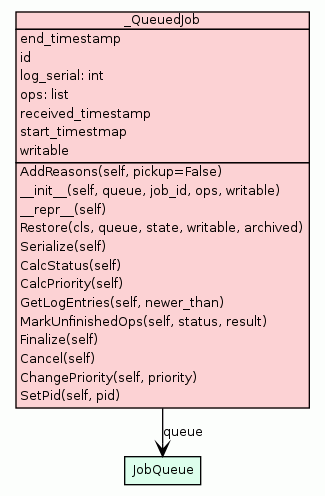
| Trees | Indices | Help |
|
|---|
|
|

In-memory job representation.
This is what we use to track the user-submitted jobs. Locking must be taken care of by users of this class.
|
|||
|
|||
|
|||
|
|||
| dict |
|
||
|
|||
| int |
|
||
| list |
|
||
|
|||
|
|||
| tuple; (bool, string) |
|
||
| tuple; (bool, string) |
|
||
|
|||
|
Inherited from |
|||
|
|||
| _JobQueue |
|
||
|
|||
|
|||
|
|||
|
end_timestamp the timestamp for end of execution |
|||
|
id the job ID |
|||
| int |
log_serial holds the index for the next log entry |
||
| list |
ops the list of _QueuedOpCode that constitute the job |
||
| JobQueue |
queue the parent queue |
||
|
received_timestamp the timestamp for when the job was received |
|||
|
start_timestmap the timestamp for start of execution |
|||
|
writable Whether the job is allowed to be modified |
|||
|
|||
|
Inherited from |
|||
|
|||
Extend the reason trail Add the reason for all the opcodes of this job to be executed. |
Constructor for the _QueuedJob.
|
repr(x)
|
Restore a _QueuedJob from serialized state:
|
Serialize the _JobQueue instance.
|
Compute the status of this job. This function iterates over all the _QueuedOpCodes in the job and based on their status, computes the job status. The algorithm is:
|
Gets the current priority for this job. Only unfinished opcodes are considered. When all are done, the default priority is used.
|
Selectively returns the log entries.
|
Mark unfinished opcodes with a given status and result. This is an utility function for marking all running or waiting to be run opcodes with a given status. Opcodes which are already finalised are not changed.
|
Marks job as canceled/-ing if possible.
|
Changes the job priority.
|
Sets the job's process ID
|
| Trees | Indices | Help |
|
|---|
| Generated by Epydoc 3.0.1 on Mon Aug 22 11:13:22 2016 | http://epydoc.sourceforge.net |